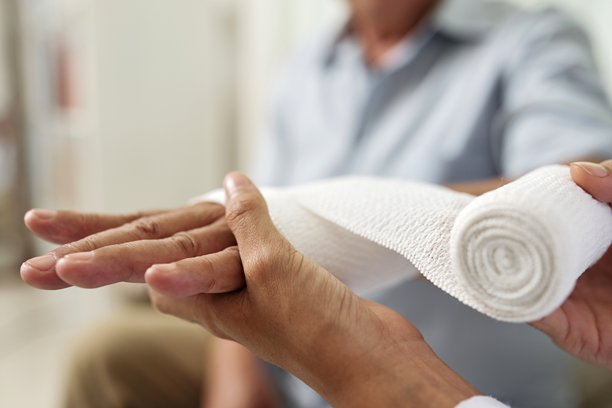Accidents and injury can happen to anyone, at any time.
For most of us, cuts and scrapes are just part of life, but if a wound is left untreated, it can lead to infection, delayed healing, or even scarring. In some cases, wounds can become chronic, taking weeks or even months to heal and often needing specialised care.
That’s why it’s so important to be prepared at home with a well-stocked first aid kit - and to know where to go when you need support.
This Wound Awareness Week, learn how to stay wound-aware and how your local community pharmacist can help.
Wound care starts at your pharmacy
Minor wounds, such as cuts, grazes, and burns, can often be treated at your local pharmacy. Pharmacists are highly trained healthcare professionals with the knowledge and experience to support you with proper wound care.
While they’re well-equipped to manage minor wounds, it’s also important to know when to seek further medical attention - particularly for more serious injuries. Even for small wounds, it’s a good idea to get advice from a healthcare professional rather than trying to manage it on your own.

Wound care services
The good news is that some community pharmacies now offer dedicated wound care services. Your pharmacist will begin by examining the wound and asking how it occurred. The area will then be thoroughly cleaned to remove any foreign material such as dirt, glass or debris.
Once the wound is clean, the pharmacist will stop any bleeding and apply an appropriate dressing to support healing.
In some cases, if there's any uncertainty about whether something remains in the wound, your pharmacist may refer you to a GP or hospital emergency department.
Wound treatment aftercare
Wounds require ongoing care to ensure proper healing and recovery. Your pharmacist can provide advice on how to clean and redress the wound, recognise signs of infection, and know when it’s time to seek further medical attention.
Wounds can be the first sign of a larger issue, such as uncontrolled diabetes. Community pharmacists are able to speak to patients, aiming to find solutions to prevent further complications.
Community pharmacists may also recommend suitable pain relief and offer tips to support faster healing, such as maintaining a balanced diet and proper skincare.
Wound care supplies
In addition to treatment, your local community pharmacy offers a range of wound care supplies, including:
With wound care products and advice readily available at community pharmacies, drop by your local pharmacist and be prepared for when the unexpected happens.



